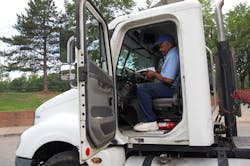UPDATED: NTSB issues views on changing employment-screening process for truck drivers
The aftermath of a fatal truck-train collision a year-and-half ago could soon greatly impact the employment-screening process for truck drivers.
That crash occurred at a Miriam, NV, railroad-grade crossing on June 24, 2011, when a tractor pulling two empty side-dump trailers on US Highway 95 struck an Amtrak passenger train. The collision destroyed the tractor and two passenger railcars and killed four train passengers, the train conductor and the truck driver. The investigation report of the accident can be accessed at the National Transportation Safety Board (NTSB) website under Report No. NTSB/HAR-12/03.
NTSB, as a result of that investigation, has issued 19 new recommendations to various federal regulatory agencies, several industry associations, including the American Trucking Assns. (ATA), as well as the Nevada Highway Patrol and John Davis Trucking Inc.
Most significant industry-wide are the four recommendations NTSB has made to the Federal Motor Carrier Safety Admin. (FMCSA), which-- if adopted by the agency-- would alter how truck drivers are screened before employment.
In her letter to FMCSA Administrator Anne S. Ferro, NTSB Chair Deborah A.P. Hersman details three points relate driver screening and one regarding brake-monitoring.
If put into action by FMCSA, the screening recommendations would result in establishment of a national database for CDL holders and require motor carriers to screen 10 years’ worth of employment history prior to hiring a driver.
Here are the four NTSB Safety Recommendations made to FMCSA:
- H-12-54: Create a mechanism to gather and record commercial driving-related employment history information about all drivers who have a commercial driver’s license, and make this information available to all prospective motor carrier employers.
- H-12-55: Using the mechanism developed in Safety Recommendation H-12-54, require motor carriers to conduct and document investigations into the employment records of prospective drivers for the 10 years that precede the application date.
- H-12-55: Require motor carriers to retrieve records from the Commercial Driver’s License Information System (CDLIS) and the National Driver Register (NDR) for all driver applicants so that they can obtain a complete driving and license history of prospective drivers.
- H-12-56: Inform commercial vehicle inspectors of (1) the importance of taking pushrod stroke measurements within the specified pressure range, (2) the relationship between pushrod stroke and specific air pressure, and (3) the consequence of taking measurements outside of this range.
"Regarding NTSB's recommendations, ATA believes there are already some market-based solutions to the question of maintaining driver histories," Sean McNally, spokesman for the trucking lobby told FleetOwner.
"However," he added, "it's important that these recommendations don't take away from FMCSA's research-based work that can similiarly improve safety, such as the drug and alcohol clearinghouse and employer notification systems for violations."
In the close of her letter to Ferro, Hersman requested that FMCSA reply regarding the four recommendations within 90 days “detailing the actions you have taken or intend to take to implement them.”
Should FMCSA respond to the recommendations by issuing a Notice of Proposed Rulemaking on driver pre-employment screening, a public-comment period would be initiated.
